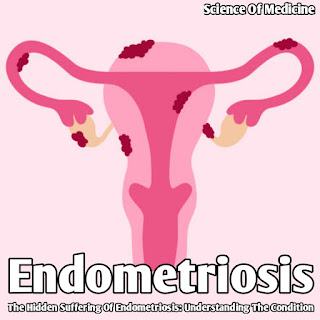Endometriosis is a chronic and often debilitating condition that affects an estimated 176 million women worldwide. Despite its prevalence, endometriosis remains shrouded in mystery, with many women struggling to find answers and relief from its crippling symptoms. In this article, we'll delve into the world of endometriosis, exploring its causes, symptoms, diagnosis, and treatment options.
What is Endometriosis?
Endometriosis is a condition in which tissue similar to the lining of the uterus, known as the endometrium, grows outside of the uterus. This misplaced tissue can implant itself on various organs and structures, including the ovaries, fallopian tubes, bladder, and bowel. During menstruation, this tissue responds to hormonal changes, leading to inflammation, scarring, and adhesions.
Causes of Endometriosis
Despite extensive research, the exact causes of endometriosis remain unclear. However, several theories have emerged:
1. *Coelomic Metaplasia*: This theory proposes that endometrial tissue arises from cells in the abdominal cavity.
2. *Retrograde Menstruation*: This theory suggests that menstrual tissue flows back through the fallopian tubes and into the abdominal cavity.
3. *Genetic Factors*: Family history and genetic predisposition may play a role in the development of endometriosis.
4. *Hormonal Imbalances*: Hormonal fluctuations, particularly estrogen dominance, may contribute to the growth and maintenance of endometrial tissue.
Symptoms of Endometriosis
Endometriosis symptoms can vary in severity and impact, but common complaints include:
1. *Pelvic Pain*: Chronic pelvic pain, cramping, and discomfort during menstruation, intercourse, or daily activities.
2. *Heavy Menstrual Bleeding*: Prolonged or heavy menstrual bleeding, clots, or spotting between periods.
3. *Infertility*: Difficulty conceiving or experiencing recurrent miscarriages.
4. *Bowel or Urinary Symptoms*: Bloating, constipation, diarrhea, or painful urination during menstruation.
5. *Fatigue and Mood Changes*: Chronic fatigue, anxiety, depression, or mood swings.
Diagnosis of Endometriosis
Diagnosing endometriosis can be challenging, as symptoms often overlap with other conditions. A comprehensive diagnosis involves:
1. *Medical History*: A thorough medical history to identify symptoms, menstrual patterns, and family history.
2. *Physical Examination*: A pelvic exam to assess for tenderness, masses, or abnormalities.
3. *Imaging Tests*: Ultrasound, MRI, or laparoscopy to visualize the reproductive organs and detect endometrial implants.
4. *Laparoscopic Surgery*: Minimally invasive surgery to confirm the presence of endometrial tissue.
Treatment Options for Endometriosis
Treatment for endometriosis depends on the severity of symptoms, extent of the condition, and individual preferences. Options include:
1. *Pain Management*: Over-the-counter or prescription pain medications to alleviate symptoms.
2. *Hormonal Therapies*: Birth control pills, progesterone, or gonadotropin-releasing hormone (GnRH) agonists to regulate hormones and reduce symptoms.
3. *Surgery*: Laparoscopic surgery to remove endometrial implants, scar tissue, or affected organs.
4. *Lifestyle Changes*: Dietary modifications, stress management, and exercise to alleviate symptoms and improve overall well-being.
Complications of Endometriosis
Untreated or undertreated endometriosis can lead to:
1. *Infertility*: Endometriosis is a leading cause of infertility in women.
2. *Chronic Pain*: Persistent pain can significantly impact daily life and mental health.
3. *Mental Health Issues*: Anxiety, depression, and mood disorders are common among women with endometriosis.
4. *Other Medical Conditions*: Endometriosis may increase the risk of developing other conditions, such as fibromyalgia, irritable bowel syndrome, or osteoporosis.
Conclusion
Endometriosis is a complex and multifaceted condition that affects millions of women worldwide. By understanding its causes, symptoms, diagnosis, and treatment options, we can work towards raising awareness, reducing stigma, and improving the lives of those affected. Remember, endometriosis is not just a women's issue – it's a human issue that requires compassion, empathy, and support.

.jpeg)

